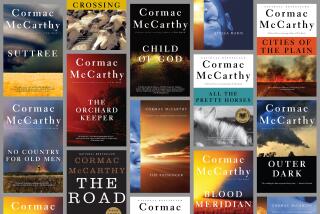The Lover of Horses and Other Stories by Tess Gallagher (Harper & Row: $16.95; 184 pp.)
- Share via
“The Lover of Horses” is a first collection of short fiction by a well-known poet whose previous books include “Instructions to the Double” and “Willingly.” For fiction, Tess Gallagher has adopted the unjudging tone of minimalism, eschewing imagery and metaphor, and trying instead for an abiding control. Her narration has an unblinking quality: Her characters, once she catches them up in the first sentence, are stubbornly stuck with until their lives, so closely watched, yield some turn of insight. With the focus so close and the prose so plain, any lack of perception--or, really, of sympathy--for these characters on Gallagher’s part would glare through. Instead, it is clear that she knows them very, very well.
This knowledge hasn’t made for 12 sunny stories. Gallagher’s settings are either Northwestern--woods, rain and countryside figure briefly--or office buildings, suburbs, backyards and malls that are utterly, if generically, American. In these places, Gallagher’s people are having a tough time making a living. There’s one Mercedes in the book, and it’s driven (in “Girls”) by a daughter whose ambition and business acumen seem almost spitefully truant to her elderly mother. The daughter drives too fast, chain-smokes, and is alternately skeptical and indifferent toward her mother’s urgent wish to be reunited with an old friend. Wisely, Gallagher shows both sides: The daughter’s nonchalance in the face of her mother’s insistence seems natural enough, yet it’s clear how cruelly deep the daughter’s indifference cuts. About emotions, “Girls” is precise; in short stories, there is no better thing to be precise about.
Overall, the collection has a sobered tone as it takes stock of lives narrower than they need be. Seven stories of twelve have a first-person narrator. These stories are as much confided as narrated, and by small-town voices whose simplicity is granted few flourishes. In “Desperate Measures,” the narrator’s self-consciousness does the story a disservice: “He said no more and we stumbled into daylight as if darkness had spewed us out new-made and molten in our separate and unknown identities.”
Possibly the language slips like that because “Desperate Measures” is a story that seems unsure of itself, structurally. At a rambling, reminiscing pace, it sketches a young woman’s infatuation with a lean, aloof stranger who “had let it be known that his presence among us was due to some temporary shift in his fortunes,” and who is finally driven, by a combination of murky circumstances, into robbing a bank. Though at the end, the narrator remembers “one day of beauty and eloquence and time at a standstill” that the renegade had given her in a tree house, the reader remains unconvinced. A day charmed for the narrator didn’t work its charm on the page.
The title story falls into dreaminess when its Irish-sounding self-dramatization could perhaps have been better balanced by a harsher skepticism about complex complicitous interacting of the narrator’s family. But “Turpentine,” with its sharper point of view and greater focus, spins from a chance encounter between a woman and an “Avon lady” a fine study of vulnerability, need and self-definition. In “Eyeglasses,” a young girl tries to dupe an eye doctor into giving her a prescription for glasses she desperately covets but doesn’t need; he diagnoses her as suffering from a rare eye disease; the crowning irony is that the girl’s parents cannot afford the surgery, and her father suffers, thinking he has failed her in this crucial way.
The narrator of “The Wimp,” furiously disappointed in her husband, confesses these emotions to women she accidentally encounters in a post office and a supermarket aisle. It’s a neat, funny twist of events that these women are easily roused into furious spiels of their own, against men. There’s an unexpected breadth to “The Wimp,” because all of that anger is at last countered by insight, and insight--following this rage-exalted tone--feels gracefully quiet and precisely right. In Gallagher’s best stories, the ambiguities are dealt with a fine hand.
More to Read
Sign up for our Book Club newsletter
Get the latest news, events and more from the Los Angeles Times Book Club, and help us get L.A. reading and talking.
You may occasionally receive promotional content from the Los Angeles Times.








